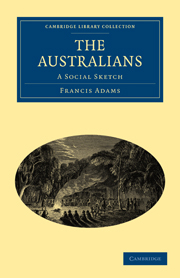V - THE LAND QUESTION
Published online by Cambridge University Press: 07 October 2011
Summary
Henry Ward Beecher, speaking in the loose manner of a popular preacher, declared once:
“If all Europe came here” (to the United States, that is), “we should not have people enough for the soil.”
No American, not even a popular preacher, would talk in that way now; but there are still plenty of Anglo-Australians, particularly of the “representative” type, with their Elysian habitat in posse, if not yet in esse, in “the dear old country,” who give more or less similar witness concerning Australia.
The truth, however, is that in both cases “the soil” is in the clutches of the landlord, whose desire for an increased population means simply the desire for labour “cheap and reliable,” or, to put it in another way, for labour competitively at his mercy.
When Western Australia was agitating for responsible government, all the rich colony-trotting lords and capitalists — the men like Lord Brassey and the late-lamented Duke of Manchester and the late-lamented Lord Carnarvon — did their best to enlighten English public opinion as to the dangers of the thing.
They pointed out what a big place Western Australia was (to wit, nearly 976,000 square miles, or more than 16 times the size of England and Wales), and with only 40,000 or 50,000 people to look after all that, and how could they be “trusted” to do so to their own best advantage and to the best advantage of everybody?
- Type
- Chapter
- Information
- The AustraliansA Social Sketch, pp. 187 - 232Publisher: Cambridge University PressPrint publication year: 2011First published in: 1893



